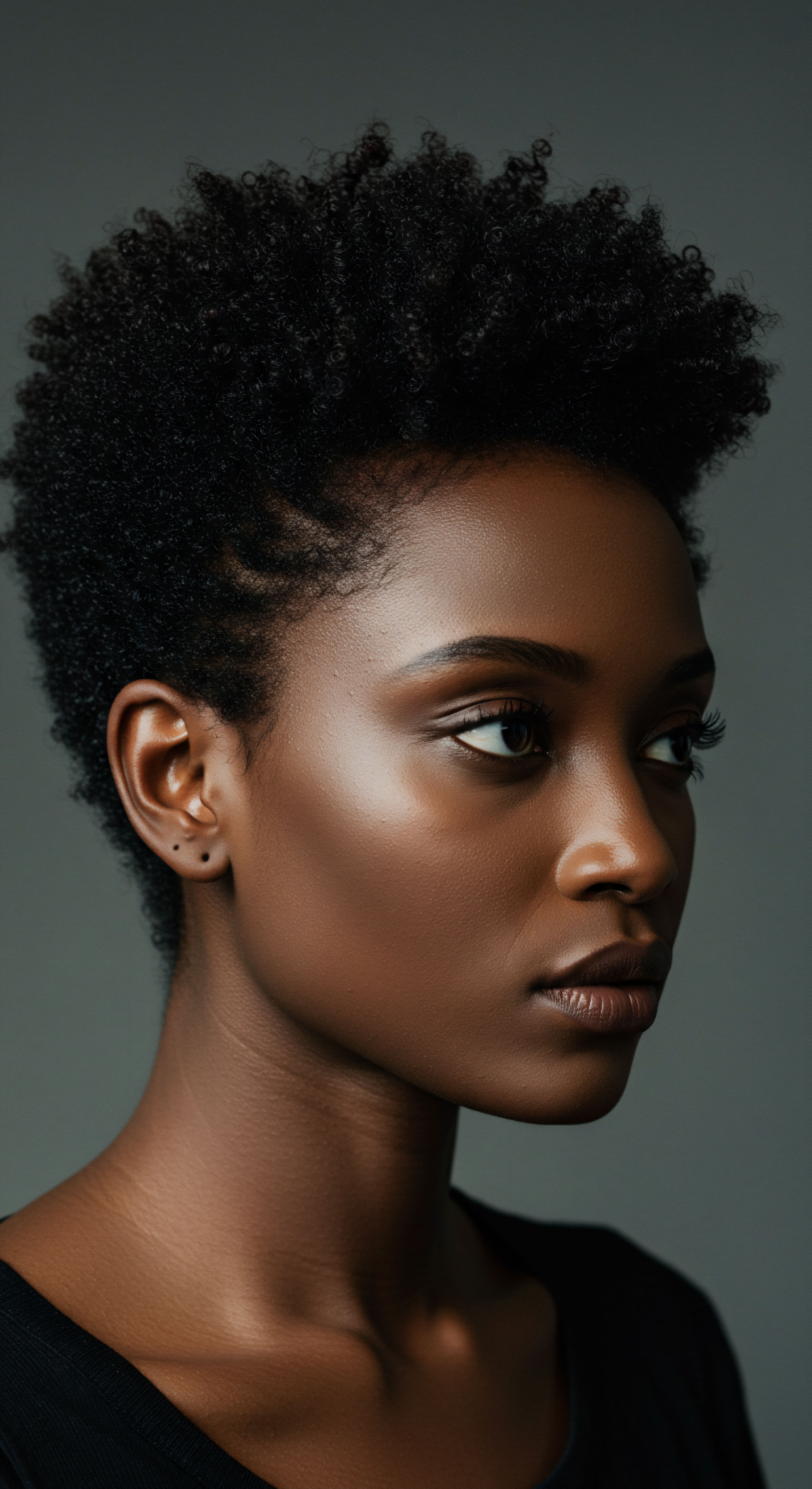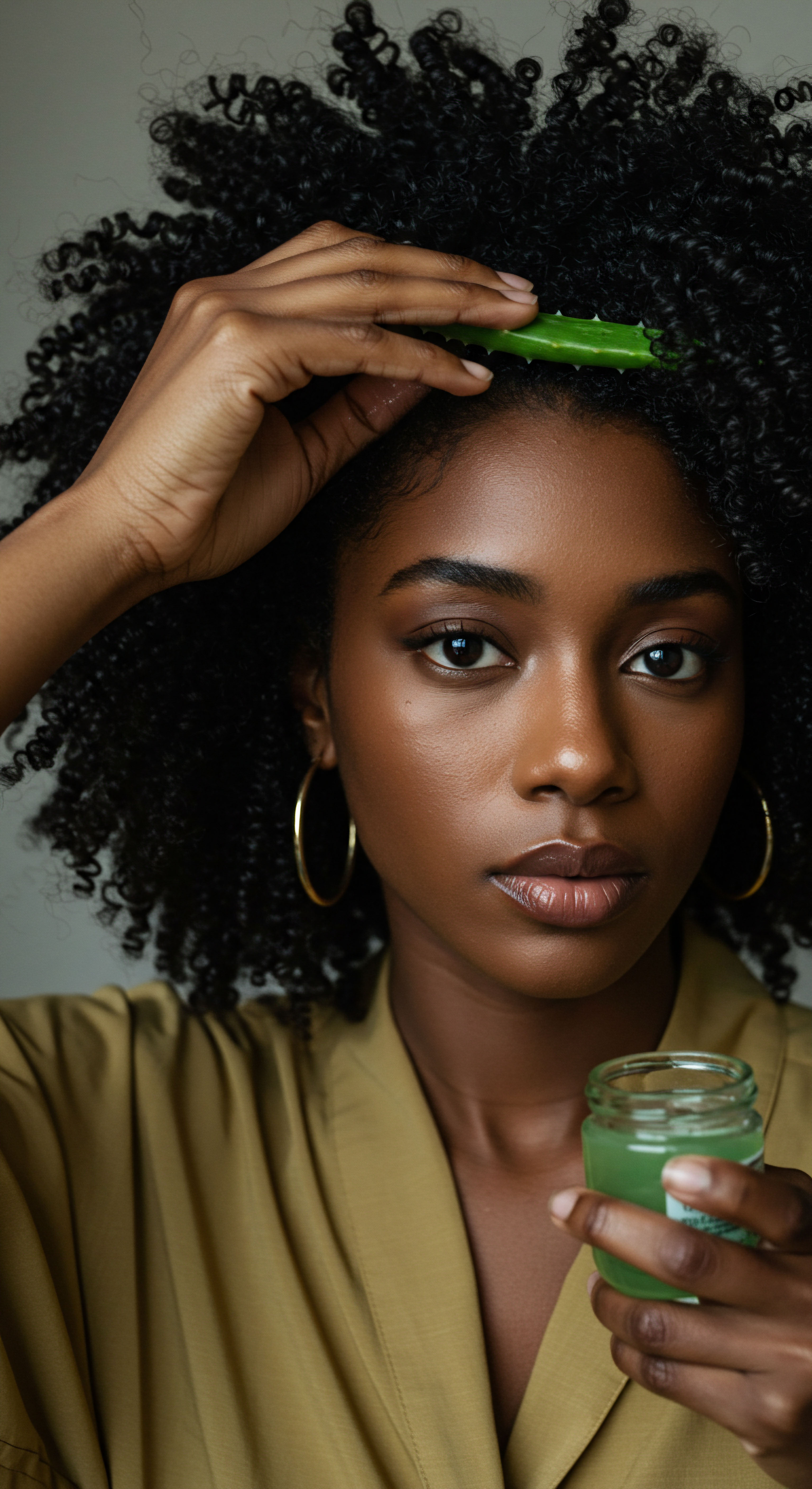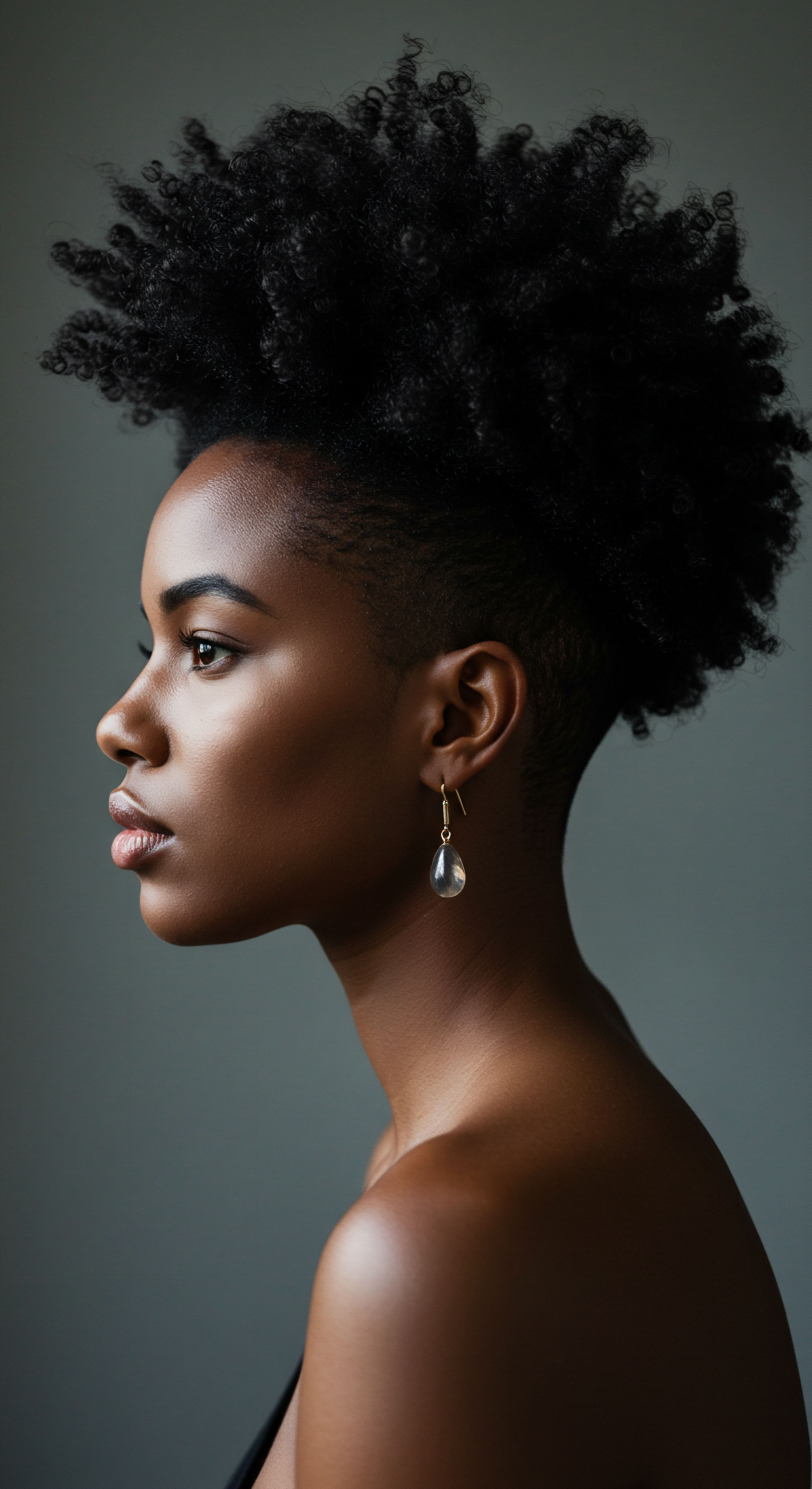
Roots
The delicate ecosystem of our scalp, a place of growth and vulnerability, holds a profound connection to the quiet rhythms of our nightly rest. Much like the earth tends to its soil for vibrant plant life, our bodies conduct vital restorative work during sleep, particularly within the very skin that cradles our hair. When the deep calm of restorative sleep is disturbed, the subtle language spoken by the immune cells residing in our scalp shifts, creating a ripple effect that can alter the health and vitality of our hair. To truly grasp the quiet whispers of poor sleep upon our textured strands, we must first descend into the foundational elements of scalp immunity, understanding the silent guardians that typically keep our scalp balanced and resilient.
At the surface, the scalp, an extension of our skin, operates as a sophisticated barrier, constantly interacting with the external world while maintaining internal harmony. This protective role is not solely physical; it is supported by a dynamic network of immune cells, each with a specialized task in surveillance and defense. These cellular sentinels form a complex system, ready to respond to environmental challenges, microbial presence, or internal shifts. Their optimal function depends on a finely tuned balance, a balance often swayed by the quality and consistency of our sleep.
The scalp’s immune system, a complex network of cellular guardians, operates best when supported by consistent, restorative sleep.

The Circadian Rhythm’s Quiet Influence
A fundamental architect of our biological world is the circadian rhythm, an internal clock orchestrating nearly every physiological process across a roughly 24-hour cycle. This rhythm extends its reach deeply into the skin and scalp, governing cell proliferation, metabolic activity, and even DNA repair mechanisms. Skin cells, including those in the hair follicles, exhibit their own intrinsic circadian oscillations, working in concert with the master clock in the brain to maintain dermal homeostasis. When the natural cadence of day and night is honored through regular sleep, these cellular clocks synchronize, allowing for efficient repair and protective functions to unfold during periods of rest.
Disruptions to this inherent rhythm, such as those caused by erratic sleep schedules or insufficient rest, can throw these local cellular clocks into disarray. This desynchronization impacts the timing and effectiveness of cellular activities, including immune responses. For instance, skin’s susceptibility to damage, like UV radiation, shows a diurnal pattern, with repair mechanisms peaking at night. If sleep is poor, these vital repair processes, which rely on the synchronized activity of various cell types, become compromised, leaving the scalp more vulnerable.

Guardians of the Scalp Microenvironment
Within the dermal layers of the scalp, several immune cell populations reside, each playing a distinct yet interconnected part in maintaining health and responding to threats. Understanding these key players sets the stage for comprehending how poor sleep can disrupt their delicate operations.
- Langerhans Cells ❉ These unique dendritic cells are positioned in the epidermis, serving as primary antigen-presenting cells. They are like the first line of intelligence, constantly sampling the environment and, upon detecting a threat, migrating to lymph nodes to activate T-cells. Their role is crucial in initiating adaptive immune responses, and their proper function relies on a healthy skin environment.
- Mast Cells ❉ Residing in the dermis, often near blood vessels and hair follicles, mast cells are renowned for their immediate response to injury or allergic reactions by releasing histamine and other inflammatory mediators. They are also deeply involved in neuroimmune interactions, acting as a bridge between the nervous system and the immune system, a connection particularly relevant in stress responses.
- T-Cells ❉ These lymphocytes, central to adaptive immunity, are present in the scalp in various subsets, including CD4+ (helper T-cells) and CD8+ (cytotoxic T-cells). They are responsible for specific recognition and elimination of pathogens or abnormal cells, and their activity is tightly regulated. An imbalance in T-cell subsets can contribute to autoimmune conditions affecting the hair follicle.
- Macrophages ❉ These versatile phagocytic cells are scavengers, clearing cellular debris and pathogens, while also presenting antigens and producing cytokines to regulate inflammation and tissue repair. They play a significant role in the inflammatory events observed around hair follicles during stress-induced hair loss.
- Keratinocytes ❉ While primarily structural, forming the protective outer layer of the skin, keratinocytes are far from passive. They are active participants in innate immunity, capable of producing a range of cytokines and chemokines that recruit other immune cells to the site of inflammation or infection. Their response helps shape the overall immune landscape of the scalp.
These cells, in their quiet vigilance, work together to preserve the integrity of the scalp. Their synchronized dance, however, requires a stable internal environment, one that is increasingly challenged when the restorative balm of sufficient sleep is withheld.

Ritual
When the gentle ritual of a full night’s sleep is broken, the body does not simply feel tired; it initiates a cascade of physiological responses that can directly impact the scalp’s delicate immune balance. This shift moves from a state of repair and regeneration to one of heightened alert, with tangible consequences for the cellular guardians beneath our hair. We often notice the visible signs of poor sleep in our complexion—dullness or increased sensitivity—but the changes beneath the surface, particularly within the scalp’s immune landscape, hold deeper implications for hair health.

The Hormonal Response to Sleep Disruption
One of the most immediate and impactful responses to insufficient sleep is the elevation of stress hormones, particularly Cortisol. Normally, cortisol levels naturally decline during the evening, allowing the body to enter a state of rest and repair. However, when sleep is fragmented or too short, cortisol levels remain elevated, signaling a persistent state of physiological stress. This prolonged presence of cortisol has direct effects on the immune system, often leading to a suppression of some immune functions while simultaneously promoting inflammation.
For the scalp, this means that the regulatory influence of cortisol can directly alter the behavior of immune cells. High cortisol levels can affect the function and cyclic regulation of the hair follicle itself. Research indicates that elevated cortisol indirectly influences hair follicle stem cell activity, effectively blunting their regenerative capacity. This can push hair follicles prematurely into a resting phase, leading to increased shedding.
Disrupted sleep elevates stress hormones, which in turn can suppress immune functions and promote inflammation within the scalp.

The Inflammatory Signal
Beyond hormonal shifts, poor sleep directly contributes to an increase in pro-inflammatory cytokines throughout the body, including those that circulate to the scalp. These signaling molecules, such as interleukin-1 beta (IL-1β), interleukin-6 (IL-6), and tumor necrosis factor-alpha (TNF-α), are normally part of the body’s defense system, but their sustained elevation indicates chronic inflammation.
When these inflammatory markers rise, they can disturb the normal functioning of scalp immune cells. For instance, IL-1β and TNF-α have been shown in laboratory studies to cause structural changes within hair matrix cells and disrupt the hair cycle, potentially leading to premature arrest of hair cycling. This inflammatory environment can also worsen existing inflammatory skin conditions, including those affecting the scalp, such as psoriasis or atopic dermatitis. The bidirectional relationship here is striking ❉ inflammatory skin conditions can disrupt sleep, and poor sleep can, in turn, exacerbate the inflammation.
The scalp’s barrier function, a crucial aspect of its defense, can also be compromised by sleep deprivation. Studies indicate that insufficient sleep impairs the skin’s barrier, leading to increased transepidermal water loss and reduced hydration. A weakened barrier makes the scalp more susceptible to external irritants and microbial imbalances, which can further activate resident immune cells, driving a cycle of irritation and discomfort.
| Factor Cortisol |
| Change with Poor Sleep Elevated levels |
| Impact on Scalp/Immune Cells Blunts hair follicle stem cell activity, disrupts hair cycle, promotes inflammation |
| Factor Melatonin |
| Change with Poor Sleep Reduced production |
| Impact on Scalp/Immune Cells Impacts hair growth cycle regulation, reduces antioxidant protection |
| Factor Pro-inflammatory Cytokines (IL-1β, IL-6, TNF-α) |
| Change with Poor Sleep Increased levels |
| Impact on Scalp/Immune Cells Causes structural changes in hair matrix cells, disrupts hair cycle, exacerbates inflammatory skin conditions |
| Factor These internal shifts create a less hospitable environment for optimal scalp and hair health. |

Relay
The deeper inquiry into how poor sleep shapes the scalp’s immune landscape unearths a complex interplay, a nuanced conversation between our nightly rest and the very cellular structures that guard our hair. It is here that we move beyond the immediate surface observations to discern the profound, long-term implications for textured hair, revealing how specific immune cell populations bear the brunt of chronic sleep disruption. The story of our hair, after all, is deeply interwoven with the narrative of our entire being, a sensitive gauge of our internal harmony.

Monocytes and the Shifting Immune Profile
Recent scientific exploration has shed light on how even a single night of severely restricted sleep can instigate remarkable changes in our circulating immune cells. A compelling study published in The Journal of Immunology found that a mere 24 hours of sleep deprivation in healthy, young individuals altered the profile of their Monocytes, a crucial component of the innate immune system. These cells, which serve as the body’s rapid first responders, began to resemble the monocyte profiles observed in individuals experiencing chronic inflammation, such as those with obesity.
This research highlights a significant finding ❉ sleep deprivation can increase the rate of production of immune cells in the bone marrow, leading to an elevated number of these cells in circulation, and crucially, their DNA structure can be altered. The study noted that if these shifts persist, they could contribute to long-term inflammatory states. While this particular study focused on systemic immune changes, the implications for the scalp are direct, as these circulating monocytes contribute to the local immune environment, influencing inflammatory processes that can affect hair follicles. A prolonged inflammatory state can directly hinder hair growth and overall scalp vitality.

T-Cell Dynamics and Autoimmune Hair Conditions
The adaptive immune system, with its highly specialized T-cells, also responds to the signals of poor sleep. While the exact mechanisms are still under investigation, the link between sleep disturbances and autoimmune conditions, including those affecting hair, is becoming clearer. Alopecia Areata (AA), an autoimmune disorder characterized by non-scarring hair loss, is a prime example where T-cells mistakenly attack hair follicles.
A Korean study conducted between 2002 and 2013 provided a compelling data point, observing that patients diagnosed with sleep disorders carried a significantly higher risk of developing alopecia areata compared to those without sleep disturbances. This suggests a profound connection where insufficient sleep might act as a trigger or an exacerbating factor for the immune system’s misdirection against its own hair follicles. The study further found a complex relationship, noting that alopecia areata itself can contribute to stress, anxiety, and depression, which in turn disrupt sleep, establishing a challenging cycle.
In alopecia areata, there is often an intense inflammatory infiltration around hair bulbs, featuring mononuclear cells, eosinophils, and notably, CD3+ and CD8+ T-cells. These T-cells are implicated in the destruction of hair follicles, mediated by antigen-presenting cells. Sleep deprivation is understood to adversely influence immunological modulation, potentially resulting in heightened inflammation and autoimmune reactions. The precise pathways remain under scrutiny, but disruptions in the hypothalamus-pituitary-adrenal (HPA) axis, which governs stress responses, are believed to contribute significantly to this connection.

Mast Cell Activity and Hair Follicle Disruption
Mast Cells, the sentinel cells residing near hair follicles, are highly responsive to stress signals, including those arising from sleep deprivation. When under chronic stress, these cells can become hyperactive, releasing an excess of inflammatory mediators like histamine. This uncontrolled release can lead to localized inflammation around the hair follicle, a process observed in animal studies of stress-induced hair loss.
Research in mice has shown that stress can lead to the clustering of macrophages and excessive mast cell activation in the hair follicle environment, contributing to stress-induced hair loss. This localized inflammatory event, driven by mast cell degranulation, can directly interfere with the hair growth cycle, potentially pushing active hair follicles into a premature resting phase and increasing shedding.
A single night of restricted sleep can alter monocyte profiles, and chronic sleep disruption correlates with heightened risk for autoimmune hair loss conditions.

The Interplay of Circadian Rhythms and Immune Regulation
The profound link between sleep, circadian rhythms, and scalp immunity extends to the very regulatory mechanisms of the hair cycle. Hair follicles themselves possess their own circadian clocks, which influence their growth phases. When the body’s master circadian clock is thrown off balance by poor sleep, these local hair follicle clocks can also become desynchronized. This disruption can lead to a less efficient and less robust hair growth cycle.
A study published in Cell Reports in 2019 linked circadian rhythm disruptions, as experienced by shift workers, to decreased stem cell activity in hair follicles. This observation suggests that chronic disruption can reduce the regenerative capacity of these cells over time, potentially resulting in thinner, weaker hair. The ability of the skin and its resident immune cells to repair DNA damage, for example, peaks at night, influenced by circadian rhythms. If sleep is inadequate, this critical nightly repair process is compromised, leaving cells, including those in the hair follicle, more vulnerable to accumulated damage and dysfunction.
| Immune Cell Type Monocytes |
| Specific Response to Poor Sleep Altered profile, resembling chronic inflammation; increased production in bone marrow |
| Consequence for Scalp/Hair Contributes to a systemic and local inflammatory environment, potentially affecting hair follicle health. |
| Immune Cell Type T-cells (CD8+, CD3+) |
| Specific Response to Poor Sleep Immunological modulation adversely affected; linked to autoimmune reactions |
| Consequence for Scalp/Hair Increased risk or exacerbation of autoimmune hair loss conditions like alopecia areata. |
| Immune Cell Type Mast Cells |
| Specific Response to Poor Sleep Hyperactivity and excessive release of inflammatory mediators (histamine) due to stress |
| Consequence for Scalp/Hair Localized inflammation around hair follicles, interfering with the hair growth cycle and leading to increased shedding. |
| Immune Cell Type Hair Follicle Stem Cells |
| Specific Response to Poor Sleep Reduced activity and regenerative capacity due to elevated cortisol and circadian disruption |
| Consequence for Scalp/Hair Slower hair growth, increased time in resting phase, potentially thinner or weaker hair over time. |
| Immune Cell Type These cellular shifts collectively underscore the significant, interconnected impact of poor sleep on scalp immunity and hair health. |
The implications for textured hair are particularly resonant. Textured hair often requires specific care and attention to maintain its strength and moisture. When the scalp’s immune system is compromised by poor sleep, leading to increased inflammation, impaired barrier function, or disrupted hair cycles, these challenges can be amplified.
A scalp experiencing chronic low-grade inflammation may be more prone to dryness, itchiness, or conditions that hinder optimal hair growth, making the journey to healthy, vibrant textured hair more arduous. The sensitivity of textured hair to its environment means that internal disruptions, such as those caused by sleep, can manifest more noticeably in its appearance and resilience.

Reflection
The subtle interplay between our nightly rest and the hidden world of immune cells beneath our scalp truly underscores a profound truth ❉ our hair, in all its unique texture and strength, is a living testament to our inner balance. The quiet hours of sleep are not merely a pause from the day’s demands; they are a sacred time when the body diligently tends to its cellular garden, nurturing the very roots of our vitality. When this delicate rhythm is disturbed, the signals sent throughout our system, including those to our scalp’s protective cells, shift from harmony to a state of heightened alert. This gentle exploration into the cellular dance affected by poor sleep reveals how deeply connected our external appearance is to our internal rhythms, inviting us to consider sleep not as a luxury, but as a foundational pillar of radiant health, from the inside out.

References
- HairFree & HairGrow. Sleep and Hair Loss. Relationship Explained. 2023.
- Ma, D. et al. The circadian clock and diseases of the skin. PMC, PubMed Central, 2020.
- Ruszova, E. et al. Circadian Oscillations in Skin and Their Interconnection with the Cycle of Life. MDPI, 2022.
- Lee, K. et al. Hair Follicles as a Critical Model for Monitoring the Circadian Clock. PMC, PubMed Central, 2023.
- Spreading Clean Beauty. What regulates circadian rhythms and its impact on skin health. 2024.
- Innovative Dermatology. The Transformative Power of Sleep for Healthy Skin. 2024.
- Open Exploration Publishing. Skin and immune cells crosstalk via circadian regulations. 2021.
- Lin, H. et al. Circadian Rhythm and the Skin ❉ A Review of the Literature. PMC, PubMed Central, 2019.
- Wang, Y. et al. How and Why the Circadian Clock Regulates Proliferation of Adult Epithelial Stem Cells. Oxford Academic, 2017.
- DiStefano Hair Restoration Center. Does Sleep Affect Hair Health? 2025.
- O’Donovan, R. et al. Sleep deprivation and the skin. Clinical and Experimental Dermatology, Oxford Academic, 2023.
- DUTCH Test Blog. Stress, Hair Loss, and Cortisol Connection. 2023.
- Art of Dermatology. How Sleep Affects The Skin. 2023.
- Russell, G. et al. Stress-linked cortisol concentrations in hair ❉ what we know and what we need to know. PMC, PubMed Central, 2012.
- O’Donovan, R. et al. Sleep deprivation and the skin. Oxford Academic, 2023.
- Medical News Today. Eczema ❉ How skin diseases can produce sleep disturbances. 2023.
- The Journal of Immunology. One day of sleep deprivation can alter your immune system and increase inflammation. 2025.
- García-Avilés, A. et al. Modeling integrated stress, sleep, fear and neuroimmune responses ❉ Relevance for understanding trauma and stress-related disorders. PubMed Central, 2018.
- Anthony Pearce Trichology. Adrenal function and its influence on scalp hair. 2022.
- Mount Sinai. A Consistent Lack of Sleep Negatively Impacts Immune Stem Cells, Increasing Risk of Inflammatory Disorders and Heart Disease. 2022.
- Medical News Today. Stress and hair loss ❉ Are they related? 2023.
- Centre Clauderer. Hair and sleep ❉ the importance of the night for hair health. 2024.
- Wikipedia. Cortisol. 2024.
- The Korean Encephalitis and Neuroinflammation Society. Sleep and neuroimmunology ❉ a narrative review. SCHMC, 2024.
- Sharma, A. et al. Diffuse alopecia areata is associated with intense inflammatory infiltration and CD8+T cells in hair loss regions and an increase in serum IgE level. ResearchGate, 2012.
- Clinikally. Impact of Sleep Deprivation on Hair Health. 2024.
- Managed Healthcare Executive. New Study Ties Sleep Loss to Overactive Immune System. 2022.
- American Association of Critical-Care Nurses. Sleep and Immune Function. 2012.
- Al-Rashed, F. et al. Impact of sleep deprivation on monocyte subclasses and function. Oxford Academic, 2025.
- Good Health by Hims. Does Lack of Sleep Cause Hair Loss? 2024.
- Besedovsky, L. et al. The Sleep-Immune Crosstalk in Health and Disease. PMC, PubMed Central, 2019.
- Natarelli, N. et al. Integrative and Mechanistic Approach to the Hair Growth Cycle and Hair Loss. eScholarship.org, 2023.
- Physiopedia. Mast Cell Activation Syndrome (MCAS). 2023.
- Lin, H. et al. Bidirectional association between alopecia areata and sleep disorders ❉ A population-based cohort study in Taiwan. ResearchGate, 2020.
- Sato-Kawamura, M. et al. Strong expression of CD40, CD54 and HLA-DR antigen and lack of evidence for direct cellular cytotoxicity are unique immunohistopathological features in alopecia areata. PubMed, 2003.
- Frontiers. Editorial ❉ Beyond the borders ❉ The gates and fences of neuroimmune interaction, volume II. 2022.
- Drucker, C. et al. Targeting T-Cell–Based Therapies to Treat Alopecia Areata. 2024.
- Keystone Symposia. Neural-Immune Interactions ❉ A Systems-Wide Perspective on Whole Organism Physiology. 2024.
- Frontiers. Editorial ❉ Beyond the borders ❉ The gates and fences of neuroimmune interaction, volume II. 2022.
- Wimpole Clinic. Can Lack of Sleep Cause Hair Loss? 2024.
- Langerhans cell Histiocytosis in Adults. 2024.
- Torello, C. et al. Sleep Loss and Cytokines Levels in an Experimental Model of Psoriasis. PMC, 2012.
- The PMFA Journal. Chronic telogen effluvium reversal using E. coli-derived cytokines and growth factors ❉ a case report. 2024.
- Peters, E. et al. Stress Inhibits Hair Growth in Mice by Induction of Premature Catagen Development and Deleterious Perifollicular Inflammatory Events via Neuropeptide Substance P-Dependent Pathways. ResearchGate, 2007.
- Chen, M. et al. Immunomodulatory effects of sleep deprivation at different timing of psoriasiform process on skin inflammation. PubMed, 2019.
- Abdel-Malek, Z. et al. Redefining the Role of Langerhans Cells As Immune Regulators within the Skin. Frontiers, 2018.